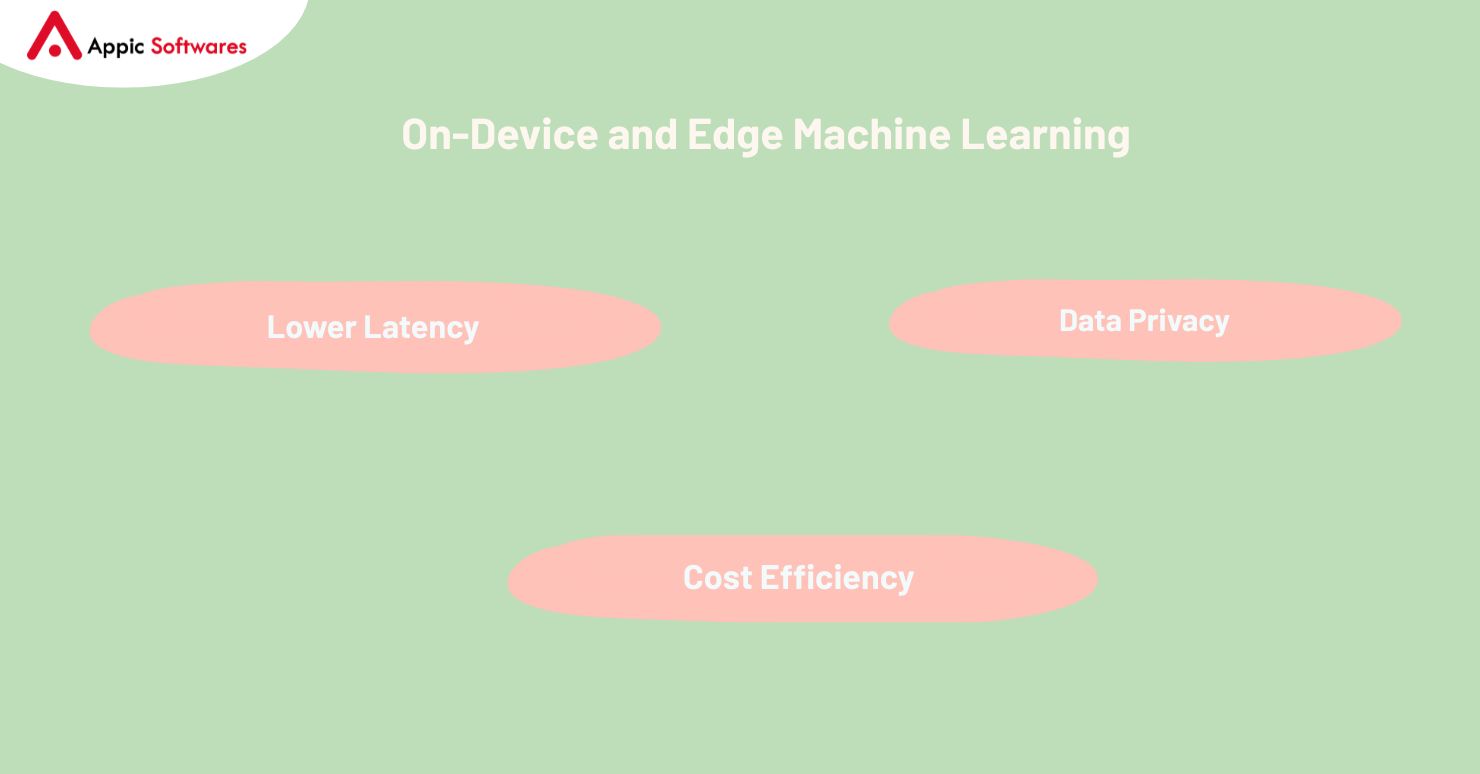
Machine learning (ML) is no longer just a concept in research labs. It
is now a key part of modern business applications. From healthcare to finance, retail to real estate, ML is transforming industries. With advances in AI, businesses can now build apps that learn from data, predict trends, and automate decisions.
Cloud computing, large datasets, and better algorithms make ML accessible for businesses of all sizes. Small and mid-sized companies can now use ML to enhance customer experience, reduce costs, and increase revenue.
If your business is thinking about Machine learning development, it is important to understand trends, use cases, and technology choices. This guide explains what you need to know.
Why Machine Learning in Apps Matters
Machine learning makes apps intelligent. Traditional software follows fixed rules. ML apps learn from data and adapt over time. This ability to learn is crucial because customer expectations are increasing.
Rising Customer Expectations
Users expect apps to provide personalized experiences, fast responses, and accurate recommendations. In e-commerce, for example, customers want product suggestions that match their preferences and price sensitivity. Dynamic pricing in e-commerce works effectively because ML models can analyze demand, competitor pricing, and seasonal trends to adjust prices in real-time.
Cloud Power and Lower Costs
Previously, machine learning required expensive infrastructure. Today, cloud platforms such as AWS, Google Cloud, and Azure make ML accessible and scalable. Businesses can train models without investing heavily in hardware. Cloud-based ML reduces costs, speeds up deployment, and enables continuous improvements.
What Defines a Machine Learning App
Adding a model to an app does not automatically make it intelligent. A true ML app is a complete ecosystem. It includes data pipelines, models, APIs, and user experience design.
Model Is Not the Product
The ML model itself is not the end goal. The real product is the enhanced experience it provides. For example, a retail recommendation engine only matters if it improves sales or engagement.
Bonus read: Top 10 Advances In Financial Machine Learning
Continuous Learning and Updates
ML models need ongoing updates. Customer behavior and market trends evolve constantly. Without monitoring and retraining, models lose effectiveness, known as model drift. Successful ML apps are continuously improved to remain accurate and relevant.
Business Use Cases That Deliver Real Value
Machine learning applications span many industries and generate tangible benefits.
Customer Service and Generative AI
AI-powered chatbots and virtual assistants handle customer inquiries efficiently. They can answer common questions instantly and escalate complex issues. Generative AI takes this further by creating personalized responses and summarizing user queries, making apps more interactive and intelligent.
Marketing, Sales, and Dynamic Pricing
In e-commerce, dynamic pricing works using ML models that analyze real-time market data, demand, and inventory levels. Marketing teams leverage ML for customer segmentation, personalized promotions, and content recommendations. Sales teams use ML for lead scoring and next-best-action suggestions.
Finance: Fraud Detection and Risk Management
Financial institutions increasingly rely on machine learning to reduce fraud and assess risk. Online payment fraud detection using machine learning identifies unusual patterns in transactions to prevent financial loss. Similarly, insurance fraud detection machine learning models flag suspicious claims automatically, reducing operational costs. Fraud transaction detection using machine learning helps banks detect anomalies in real-time, protecting both customers and institutions.
Advances in financial machine learning also enable better credit scoring, risk prediction, and algorithmic trading. Models analyze complex datasets to provide insights that were impossible to achieve with traditional approaches.
Operations and Real Estate
In logistics, ML forecasts demand and optimizes delivery routes. In real estate, real estate price prediction machine learning models analyze historical trends, location data, and market dynamics to suggest property prices accurately. This benefits investors, buyers, and agents.
Healthcare
Healthcare is rapidly adopting AI and ML for better patient outcomes. In New York, hospitals are using predictive analytics for patient monitoring, treatment recommendations, and resource allocation. Machine learning models analyze medical images, patient history, and wearable data to predict risks and suggest interventions, improving care while reducing costs.
Multimodal Machine Learning Apps
The next generation of ML apps will be multimodal, processing text, audio, images, and video simultaneously.
Expanding User Input
Customers interact with apps in multiple ways: uploading photos, recording audio, scanning documents, or typing queries. Apps that handle all input types provide seamless experiences across industries.
Industry Applications
Retail apps allow users to find products by uploading a photo. Healthcare apps combine scans and patient notes to assist doctors. Educational apps combine video lessons with interactive quizzes, improving learning outcomes.
On-Device and Edge Machine Learning

Ru
nning ML models locally on devices (edge computing) is becoming essential.
Lower Latency
On-device ML provides instant responses, critical for applications like AR, gaming, and real-time analytics.
Data Privacy
Data processed locally never leaves the device. For example, health apps can analyze sensitive patient data without sharing it externally, improving compliance and trust.
Cost Efficiency
Edge ML reduces cloud bandwidth costs. Companies can run models efficiently at scale without heavy cloud expenses.
Responsible AI and Compliance
Machine learning adoption must prioritize trust and safety.
Avoiding Bias
Models can reflect biased data. Businesses need diverse datasets and continuous evaluation to prevent unfair results, especially in hiring, finance, and insurance applications.
Transparency and Explainability
ML apps must provide reasons for their decisions. For example, if a loan application is rejected, the app should explain why. This increases trust and regulatory compliance.
Global Regulations
Regions such as the EU and the US are implementing AI regulations. Businesses must follow data protection, consent, and accountability rules. Responsible AI ensures long-term adoption and avoids legal penalties.
Data Strategy: The Foundation of ML Success
Machine learning depends entirely on quality data. A robust data strategy is crucial.
Clean and Organized Data
Data quality impacts model accuracy. Businesses must address duplicates, missing values, and inconsistencies to build reliable ML apps.
Unified Data Sources
Integrating customer, product, and operational data allows a comprehensive view for predictive analytics, dynamic pricing in e-commerce, and fraud detection.
Privacy and Retention Policies
Respecting customer data is critical. Define clear retention and deletion policies. This protects privacy and ensures compliance with global regulations.
Choosing the Right Model for Your App
Not all ML models are equal. Businesses need to select models based on requirements, budget, and scale.
Using APIs
Pre-built APIs allow rapid deployment for tasks like image recognition, speech-to-text, and fraud detection. For example, online payment fraud detection using ML can leverage cloud APIs for real-time monitoring.
Fine-Tuning
Fine-tuning improves base models using business-specific data. Insurance fraud detection machine learning often relies on fine-tuning to adapt models to specific claims and patterns.
Building from Scratch
Custom models are rare but needed for unique applications. Fraud transaction detection using machine learning or real estate price prediction may require custom models to handle specialized datasets and unique business rules.
Architecture and Deployment Patterns
Machine learning apps require robust architecture for scalability and reliability.
Modular Design
A modular approach lets businesses swap models or update features without disrupting the app. For example, dynamic pricing in e-commerce apps can be updated independently of the user interface.
MLOps for Stability
Machine Learning Operations (MLOps) provides monitoring, automation, and version control. It ensures models are retrained and deployed safely.
Hybrid Deployment
Some parts of ML apps run on cloud, while others run on devices. Hybrid deployment balances latency, cost, and privacy. Healthcare apps, for example, can process sensitive data locally while syncing aggregate insights to the cloud.
The Future Landscape of ML App Development
Machine learning apps are evolving rapidly. Businesses must prepare for several trends.
Hyper-Personalization
Apps will provide experiences tailored to each individual customer. Recommendations, offers, and pricing will be highly personalized. Dynamic pricing in e-commerce works best with hyper-personalization.
Autonomous Decision-Making
Future apps will act automatically. Fraud detection systems, like online payment fraud detection using ML, can block suspicious transactions in real-time. Inventory management apps can reorder stock automatically, improving efficiency.
AI-Augmented Workforce
Employees will work with AI-powered apps as assistants. They will focus on strategic tasks, while ML handles routine work. For example, insurance apps using ML for claims review will reduce human effort but still allow intervention when needed.
Competitive Advantage
Businesses adopting ML early will gain an edge. Companies using real estate price prediction ML or fraud detection ML will outperform competitors in efficiency and decision-making. Late adopters risk losing market share.
Hospitals and clinics in New York are increasingly leveraging AI and ML for predictive analytics, patient monitoring, and treatment planning. ML models analyze patient records, wearable data, and imaging to predict health risks. This trend will continue, leading to faster diagnosis, better outcomes, and cost reduction.
Conclusion
Machine learning app development is essential for modern businesses. From dynamic pricing in e-commerce to fraud detection, insurance, real estate, finance, and healthcare, ML apps create measurable value.
Success requires strong data strategies, ethical AI practices, and careful deployment. Businesses must continuously update models, monitor performance, and prioritize privacy. The future will see autonomous decisions, multimodal apps, and AI-augmented workforces.
Companies that invest in ML today will lead tomorrow. Whether it is real estate price prediction, online payment fraud detection using ML, insurance fraud detection ML, or AI in healthcare, machine learning will be at the core of business innovation.
Transform your business with intelligent machine learning apps. Partner with Appic Softwares, the experts in ML app development, to build solutions for dynamic pricing, fraud detection, real estate prediction, healthcare, and more. Contact us today and take your business to the next level.
FAQs
1. How can machine learning improve my business app?
Machine learning can make your app smarter by predicting customer behavior, personalizing experiences, detecting fraud, and optimizing operations. For example, e-commerce apps using dynamic pricing and recommendation engines report up to 20–30% increase in sales within the first year of implementation. 91.5% of leading businesses have ongoing investments in ML and AI.
2.
Do I need a large budget to implement ML in my app?
Not necessarily. Cloud-based ML services and APIs allow businesses to integrate machine learning without heavy infrastructure costs. Studies show that companies using managed ML services can reduce development costs compared to building models from scratch.
3. How do I ensure my ML app is ethical and safe?
Responsible AI practices are essential. This includes using diverse data to avoid bias, providing explanations for automated decisions, protecting user privacy, and complying with local regulations. Companies following ethical AI guidelines report 30% higher customer trust scores and fewer compliance
issues.


